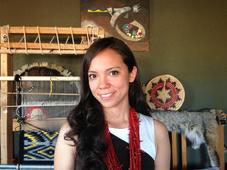Christine Ami Grant Manager, Navajo Cultural Arts Program
in her blog "Leading with Fire" have always been inherently found in the practice of the cultural arts. Personally, weaving has helped to make me a stronger individual, and I would go as far as to say a tougher Diné woman. It was a treatment plan for my bouts with insomnia, depression, and writing blocks. Weaving also held the responsibilities of a teacher, showing me how to engage my cultural belief system and fortify my critical inquiry skills and self-esteem. Throughout my time as the NCAP grant manager I have learned that cultural arts holistic well-being is an area that many of our Emerging Artisans are trying to not only fully comprehend but also to embrace. "Where do we start?" many ask as they entered the Navajo Cultural Arts Certificate Program. My response is always the same - Just do it - Work with raw materials, talk with the plants, put your scraps away properly, make mistakes and learn from them. I tell them to take care of those teachings and the many others that they will learn along the way because, as cliché as it sounds - if you take care of them, they will take care of you. With those inquisitive artisans in mind, I thought I would take a minute to address the NCAP's take on Holistic Well-Being, specifically focusing in on how artisans can start to reflect upon their work from a holistic perspective. While there have been several pieces about holistic well-being published, one article in particular stood out to our NCAP team: "The Wellness Wheel: An Aboriginal Contribution to Social Work" by Dr. Margot Loiselle and Lauretta McKenzie. What we specifically liked about this article was 1) its adaptability to indigenous paradigms; 2) its dialogue with Diné holistic well-being; 3) its encouragement to self-assess; and 4) its proposed wellness program through an analysis of four aspects: Physical/Material Aspects, Emotional/Social/Relational Aspects, Mental/Intellectual/Cognitive Aspects, and Spiritual/Ethical/Cultural Aspects. Loiselle and McKenzie created a list of guiding questions that could be used to assess an individual's well-being. NCAP critically analyzed those guiding questions to understanding how they could be adapted to further inquire into the Navajo cultural arts holistic well-being. The following are guiding questions that artisans can utilize to self-assess where they are in terms of their own cultural arts holistic well-being journey. Physical / Material Aspects:
Mental / Intellectual / Cognitive Aspects:
Spiritual / Ethical / Cultural Aspects:
These are in no means an ends to Navajo cultural arts holistic well-being; however, they have been a starting point of discussion as we worked with several Navajo cultural artisans throughout this blog series. In call a particular we would love to give a tremendous shout out and thanks to Kurtis Smith, Shayne Ray Watson, Sharonna Rae Yazzie, Sam Slater, Leonard Gene, Waycee Harvey, Troy Uentillie and Jess Williams, for helping us to gather a little further insight into the holistic well-being of Diné cultural artisans. Ahee'hee!
And for artisans who wish to create what Loiselle and McKenzie call a "self-care plan", these guiding questions may be able to help set positive goals, identify negative behaviors, and look toward creating a more holistic approach to their cultural art well-being. Stop by next week for our final blog of the series, which will include an analysis of the series' findings as well as an announcement by Miss Navajo, Crystal Littleben detailing our Summer Weekend Workshop Series!
1 Comment
6/9/2018 04:06:19 pm
I think one way to be ethical is to go vegan. When you're a vegan, you don't only keep meat, chicken, fish and seafood off the plate. You also avoid clothing and household items which uses animal products. You make sure everything you use has not been tested on animals. It's heartbreaking to watch videos of animals getting slaughtered or used as test samples on laboratories. I really don't see any point in all that cruelty.
Reply
Leave a Reply. |
Categories
All
Archives
October 2021
|
SocialsALL PHOTOS IMAGES ARE COPYRIGHT PROTECTED. PHOTO IMAGES USE IS SUBJECT TO PERMISSION BY THE NAVAJO CULTURAL ARTS PROGRAM. NO FORM OF REPRODUCTION IS PERMITTED WITHOUT WRITTEN PERMISSION FROM THE NAVAJO CULTURAL ARTS PROGRAM. |
Featured Pages |

